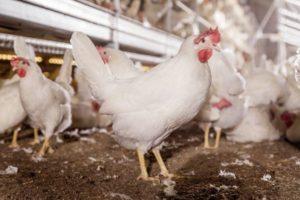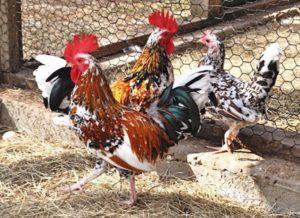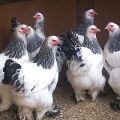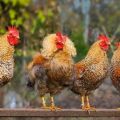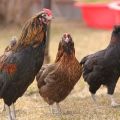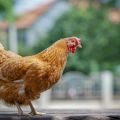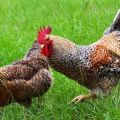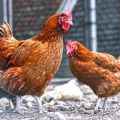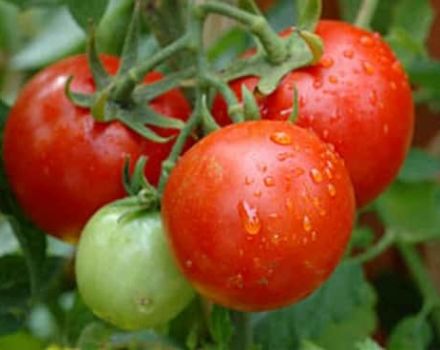Characteristics and description of the Chinese silk chicken breed, cultivation and maintenance
Breeding poultry involves choosing the right breed. Besides the common varieties, there are unique breeds. Many breeders are afraid to experiment, preferring familiar options, some believe that exotic species of unusual bird breeds require special care. When buying a Chinese silk chicken, keep in mind that it differs from conventional breeds in several ways.
The origin of the breed
The breed of Chinese Crested Aborigines has been known since the beginning of the VIII century. China is considered the birthplace of this breed. Chickens appeared on the territory of Europe after the 18th century, at the same time scientists identified the main reasons for the appearance of the variety:
- mutation of a gene that is responsible for the production of melanin;
- mutation of a gene that is responsible for the growth and formation of feathers.
Description and characteristics of Chinese silk chickens
Chinese aborigines differ significantly from their related breeds. The main differences relate to appearance.
Feathered appearance
Chinese silky chickens are classified as decorative and domestic. Outwardly, hens differ from roosters in several ways:
- the combs of chickens are black, those of cocks are purple;
- the skin of chickens and roosters is black, the meat has a gray tint;
- on paws with 4 or 5 fingers;
- roosters weigh up to 3.1 kilograms, chickens can weigh up to 2.2 kilograms.
The peculiarity of the plumage of silky chickens is explained by the fact that the feather does not have hooks in its structure. Feathers do not bond, remaining soft, creating a downy coverage. The color of the feathers can be different: from golden to light, white.
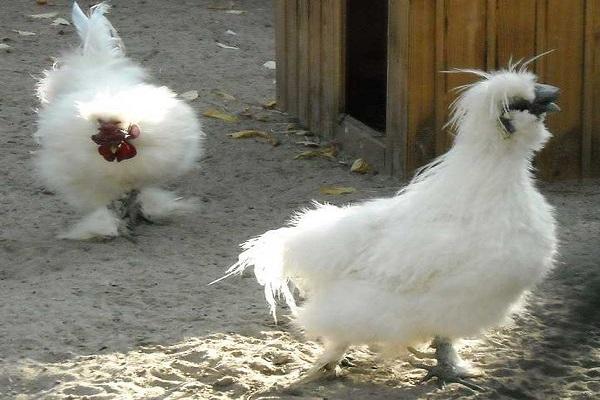
Productivity
Chickens start laying eggs from 5-6 months. They bring from 80 to 160 pieces annually. The eggs weigh about 35 grams. The color of the shell is light, cream.
When shearing from one chicken, you can get up to 150 grams of fluff, but this process is carried out on the eve of molting, so as not to deprive the chicken of its natural defenses for a long time.
The nature and temperament of birds
Chinese silky chickens are often kept in petting zoos. They are friendly, make contact with children. The birds do not show aggression, do not start fights with each other.
Advantages and disadvantages
Among the advantages of the breed are the excellent taste of meat, a spectacular appearance. Many breeders note the friendly nature of the birds.The disadvantages can be considered the high cost of specimens, unusual color of meat, low rates of egg laying.
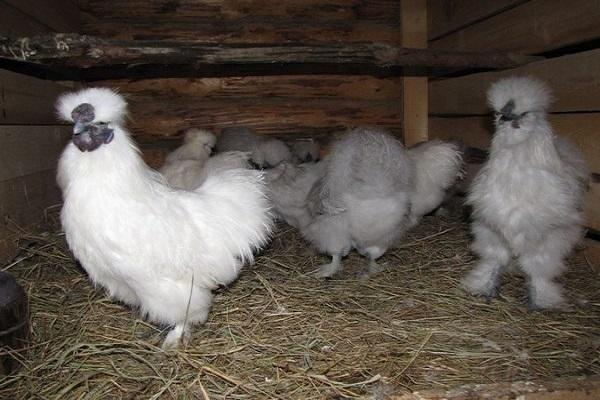
Conditions of maintenance and care
There are no special conditions for Chinese silky chickens. Particular attention is paid to the purity of the cells.
Information! Chinese chickens are very clean.
Chicken coop
Chicken coops are equipped with low perches, this is due to the fact that the breed does not fly. The nests are low, making them spacious and warm. For a comfortable stay, daily double cleaning is carried out.
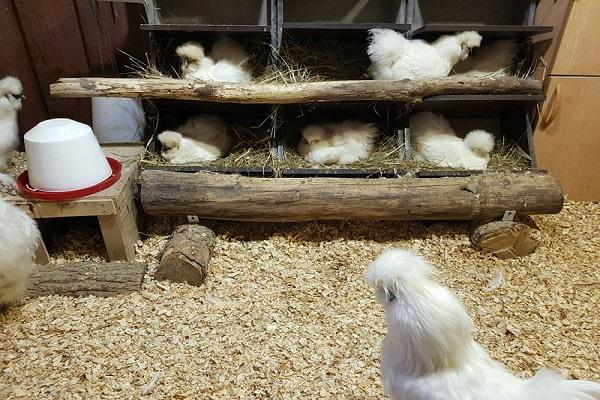
Space requirements for walking
Walking for silky natives is arranged on any site. For the purity of the fluff, the advantage will be a place with reserves of green grass, without unnecessary objects. In addition, walking should be protected from predators so that the chickens feel safe.
Advice! To avoid fights and fights that other breeds may provoke, Chinese chickens are walked separately.
Installation of feeders and drinkers
Feeders and drinkers for chickens are washed daily. Food residues should not accumulate at the bottom. Feeders and drinkers are set low so that chickens have free access.
Frost resistance of the breed
The breed is resistant to low temperatures, however, to maintain health, birds need insulation for the winter. Chickens do not like drafts, so the cracks in the winter stands are carefully sealed.
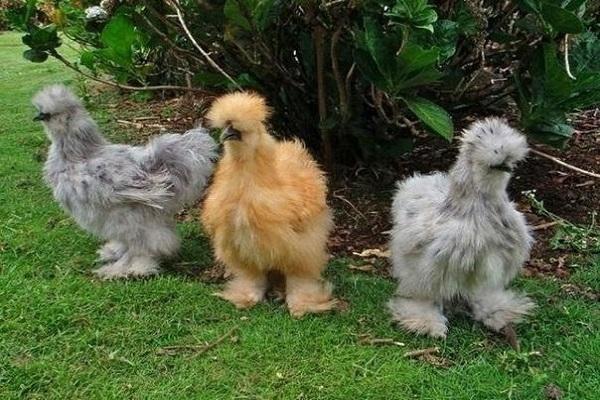
Seasonal molt
Chinese silky chickens molt annually in the spring. A natural feather change occurs, this period lasts up to 4 weeks. It is characterized by:
- stop laying eggs;
- slowness, weakness of chickens.
At this stage, breeders recommend increasing the amount of vitamins for chickens.
Planned herd replacement
The rooster lives in a flock for about 3 years, it is customary to change chickens after 4.5 years. Replacement of the herd is carried out in stages. To do this, choose one of the methods: crossbreeding is carried out, where there are from 7 to 10 chickens per rooster. Or they purchase chickens, which greatly simplifies and shortens the replacement process. Chickens of this breed are prone to hatching, so there are no problems with feeding and keeping chickens.
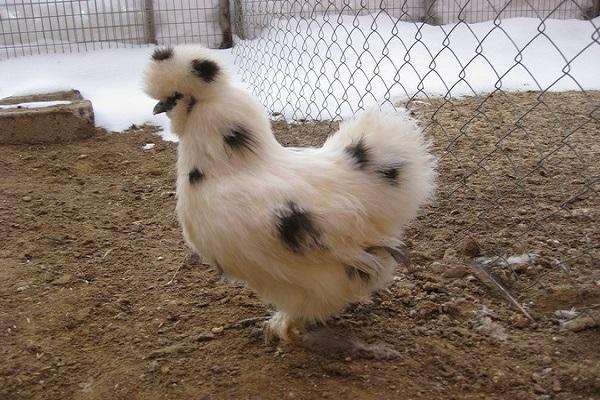
What to feed the birds
Feeding birds is of great importance, the rate of egg laying depends on it, as well as the taste of meat. The daily rate is divided into 3 meals, the diet includes:
- concentrated feed;
- potatoes and peels (50 grams per chicken);
- bread crusts soaked in water;
- green and juicy food;
- protein feed (buttermilk, whey).
Chickens are often given food leftovers, but make sure they are small, suitable for chewing. Throughout the summer season, hens take out worms and small insects while walking.
Warning! Overfeeding or underfeeding negatively affects the overall health of the hens.
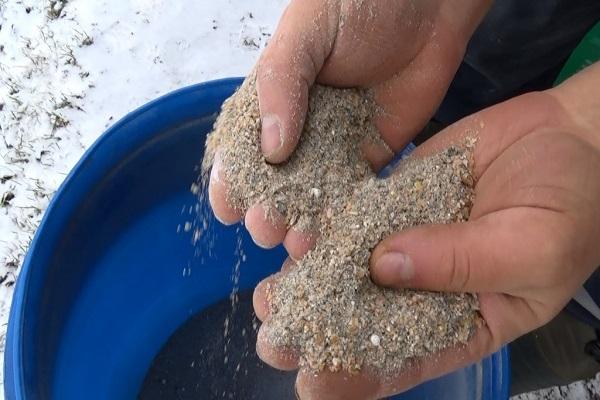
Breeding and crossing options
Selective crossing is carried out to improve the indicators of parental qualities. When crossing white meat chickens and silky Chinese aborigines, the mutated gene will dominate. Home conditions are suitable for crossing, the only requirement is the separate keeping of the crossed birds.
Information! Crossbreeding of closely related chickens results in weak offspring.
Breeding features
When growing chickens, the basic rules are observed:
- after hatching from an egg and in the first weeks of life in the poultry house, they maintain a high air temperature - up to +30 degrees, then gradually decrease to +18;
- the diet includes frequent feedings: up to a month, chickens are fed every 2 hours, after 1 month - every 3 hours;
- the diet is expanded gradually: yolk, cottage cheese are introduced, concentrated feed and special vitamins are given.
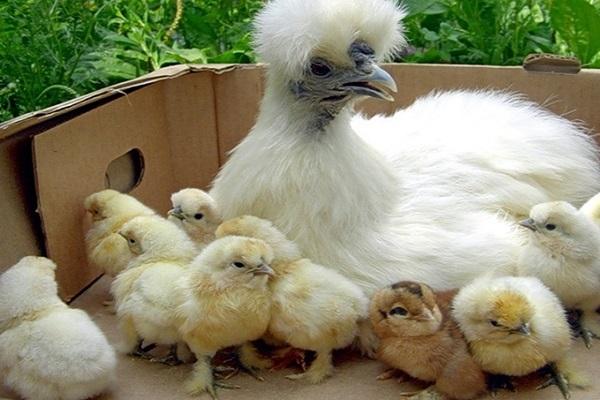
Incubation instinct
The best option for raising chickens is brooding. In silky Chinese chickens, the hatching instinct is highly developed. Other chickens are often added to chickens of this breed, they show patience, constantly take care of future offspring.
Incubator chicks
Hatching eggs are selected from morning clutches of chickens, while eggs that are too large or too small are not taken. It may take 15 to 20 days to hatch in an incubator. The period before hatching is associated with maintaining the correct temperature and humidity. If the modes are violated, biting may not occur. After the appearance of the chickens, they are removed under the lamp, for drying and adaptation, then they start nursing.
The main signs of a healthy chicken are:
- stands steadily on its feet, moves independently;
- has a reaction to sound or light;
- the instinct of pecking is developed;
- the wings are pressed to the body;
- the belly is soft and smooth.
Advice! Weak chickens are marked with brilliant green in order to be able to closely monitor their development.
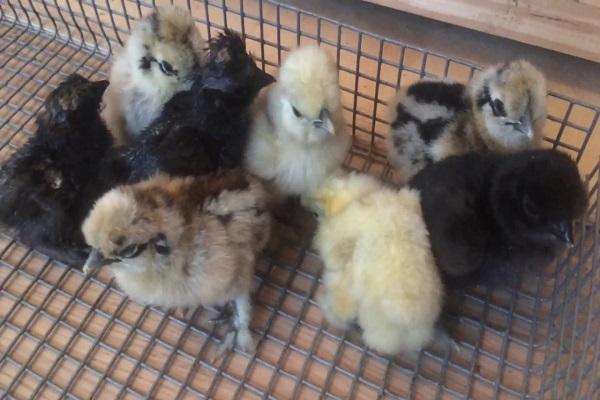
Nutrition of young animals
A special diet is provided for young animals. It should be 60 percent grain and vegetable crops. Young chickens are given boiled carrots with mashed boiled egg yolk. Gradually add cottage cheese. Grain is added after one month.
Diseases of silk chickens
For silk chickens, moisture in the house is especially dangerous. It often provokes the development of numerous diseases that lead to death.
Adults are susceptible to:
- pulmonary inflammation;
- poisoning;
- intestinal infections;
- rickets;
- coccidiosis.
For chickens, the danger is posed by the invasion of fleas, ticks.
To prevent diseases, the necessary measures are taken to help prevent complications.
- To increase the indicators of immunity, vitamin complexes for chickens must be included in the diet. The course of prophylactic admission is carried out in autumn and spring.
- Controlling water purity matters. Drinkers should be free of debris, clean and filled with fresh water.
- The house should be insulated in winter and ventilated in summer. Chinese chickens do not like drafts and temperature changes.
Information! High humidity is a danger to chickens. In addition, they should not be left wet overnight.
